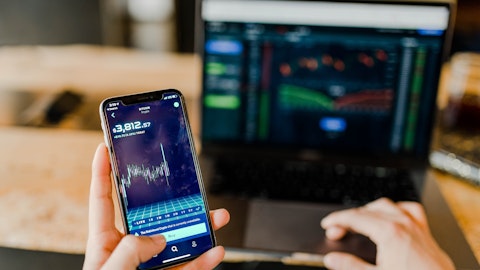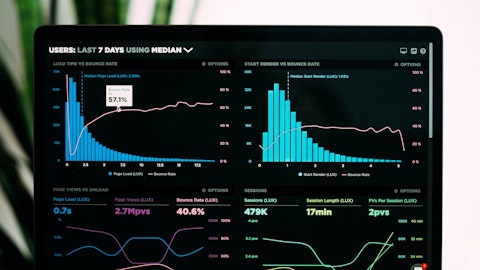1. Peloton Interactive, Inc. (NASDAQ:PTON)
Number of Hedge Fund Holders: 62
Peloton Interactive, Inc. (NASDAQ:PTON) markets fitness equipment and subscription-based online exercise classes to users across North America and worldwide. Cliff Asness purchased a stake in Peloton Interactive, Inc. (NASDAQ:PTON) in Q4 2020, and over time, he gradually reduced his position in the company before selling off the 11,939 shares he held as of Q3 2021 in the fourth quarter of 2021.
On February 8, Peloton Interactive, Inc. (NASDAQ:PTON) reported its Q4 results, posting a loss per share of $1.22, missing estimates by $0.30. The $1.13 billion revenue missed market consensus by $17.35 million.
MKM Partners analyst Rohit Kulkarni raised the price target on Peloton Interactive, Inc. (NASDAQ:PTON) to $35 from $30 but kept a Neutral rating on the shares on February 10, citing the company’s Q4 results, updated outlook, and announced management changes as reasons for the lifted price target.
At the end of the third quarter of 2021, D1 Capital Partners was a prominent Peloton Interactive, Inc. (NASDAQ:PTON) stakeholder, with more than 6.8 million shares worth $599 million. Overall, 62 hedge funds were bullish on the stock in Q3 2021.
Here is what Miller Value Partners Opportunity Equity has to say about Peloton Interactive, Inc. (NASDAQ:PTON) in its Q4 2021 investor letter:
“Money losing growth stocks posted the biggest losses late in the year. Jim Cramer termed this behavior getting “pelotoned,” as Peloton is the poster child for what we experienced. At recent prices ($31.33 as of close 1/14/22), Peloton is more than 80% off its highs. It’s reversed nearly all its pandemic gains, trading at levels close to the IPO price ($29).
We previously owned Peloton, so we know the company well. We bought Peloton after the IPO based on our belief it was a misunderstood consumer brand pegged as a faddish hardware company.
It benefited enormously from the pandemic as demand surged and customer acquisition costs plummeted. We expected these dynamics to reverse as the environment normalized from stay-at-home. We sold in late 2020 because we thought it was fully valued around $100. Growing risks created a poor risk/reward.
At current prices, it’s interesting once again and we’ve resumed work on it. Market sentiment towards money losers remains quite negative. Peloton’s prospects, like others, ultimately depend on its ability to drive free cash flow over the long term. We reference Peloton because it’s an extreme example of behavior we’ve seen more broadly.”
You can also take a look at 10 Best Dividend Stocks to Buy According to Cliff Asness’ AQR Capital Management and Warren Buffett’s Performance in 2021: 10 Best Stock Picks.





